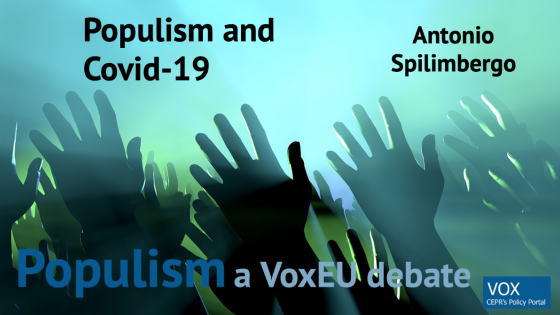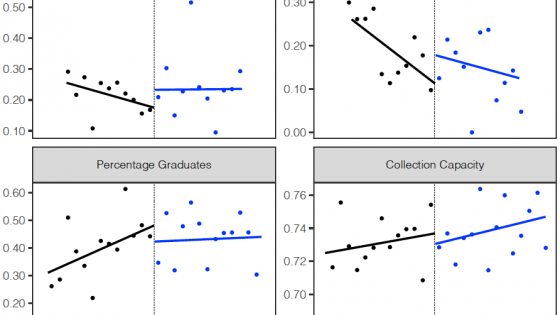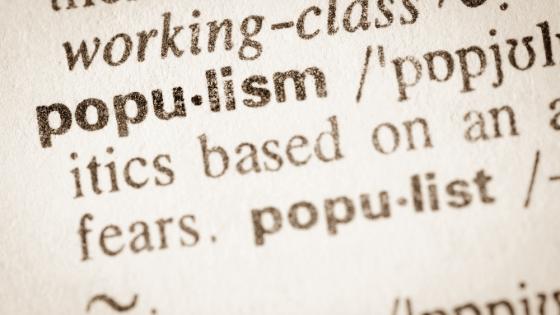This column is a lead commentary in the VoxEU debate on "Populism"
Populism is a controversial and polarising subject at the best of times, and particularly when employed in everyday conversation. This may be because politicians frequently use the term in a derogatory way, both against political opponents and as synonymous with incompetence, short-sightedness, and impulsiveness. Likewise, and with more than a hint of schadenfreude, many analysts expected Covid-19 would expose the contradictions of so-called populist politicians anew.1 But was Covid-19 a day of reckoning? If the Global Financial Crisis could make the fortunes of populist politicians by bringing them to power, would the Covid-19 pandemic finally be their undoing?2
To find out, in this column I review the reasons for which populists were expected to mishandle the pandemic in its early stages. Notably, I find no clear evidence to suggest that populists in power systematically mismanaged the response to Covid-19, and conclude that populists will remain central to our landscape in the future.
But what were the reasons that analysts expected populist politicians to mishandle the pandemic?
To begin with, it has often been said that populist politicians are better at identifying problems than at solving them, and this view is likely to have coloured the predictions of observers. Several studies, starting with Dornbusch and Edwards (1991), have argued that populists in power yielded disastrous macroeconomic performance in Latin America when dealing with other crises, and Magud and Spilimbergo (2021) extend this finding to show a similar track record of poor macroeconomic performance and weakened institutions over the last 30 years. Indeed, Funke et al. (2020) found such results for the entire world. But perhaps most worrying was the populist record of systematically undermining institutions, elements of our society which were themselves key to dealing with pandemics and other crises. With this poor track record, then, there was legitimate concern that populists would not be able to react appropriately to the growing public health emergency.
Second, trust was seen to be a fundamental part of effective containment policies during the pandemic. Communities with higher levels of trust could respond more robustly to measures mandated by governments (Brodeur et al. 2020, Eichengreen et al. 2020), with a lack of trust often associated with populist sentiments (Algan et al. 2017.) As a consequence, a lack of trust and an ineffective response to the pandemic might easily have resulted in a mutually reinforcing negative feedback loop, where communities with low levels of trust followed fewer containment measures, leading to an ineffective government response and less ability to contain the pandemic and thus eroding trust further. Even more damaging, the lack of trust was thought to permanently undermine public health experts (Eichengreen et al. 2020)
Third, populists often employed narratives which raised tensions and were not useful in the fight against the pandemic. Left-wing populists condemned public health systems for being dismantled by ‘neoliberal policies’ in the face of Covid-19, while right-wing populists emphasised the ‘foreign’ nature of the pandemic and the disproportionate price paid by locals through restrictions on their freedom (Wondreys and Mudde 2020). Populists with authoritarian tendencies also adopted a rhetoric of ‘machismo’ that minimised health risks and portrayed their nations as being at war with an imported virus (Ajzenman et al. 2020). All these narratives distracted the focus from key containment measures.
Fourth, populist politicians have often been accused of short-sightedness because of their continuous attempts to address people’s present needs. It was believed that this short-sightedness would result in a lack of consistent planning necessary to fight the pandemic.
Finally, it was often presumed that the solution to pandemic would require international collaboration to succeed. However, populist politicians (especially those with nationalistic tendencies) were against international coordination measures as these measures limited the freedom of the ‘people’.
Thus, for all these reasons, it was expected that populists in power would mishandle the response to the pandemic.
However, despite these considerations, evidence on the management of the pandemic by populist regimes has been mixed to-date. Right-wing and authoritarian governments seem to have reacted faster to the need for public health measures, at least in the initial stages of the outbreak (Toshkov et al. 2021.) In Europe, right-wing populist parties appear to have increased consensus when in power and to have remained stable when part of a coalition or in opposition (Wondreys and Mudde 2020). Other authors find that “strongly populist governments implemented fewer health measures against COVID-19 in February and fewer mobility restrictions in March of 2020” and note “…a weaker but statistically significant relationship between right-wing governments and COVID-19 policies” (Kavakli 2020) However, some have noted that “populism is associated with a greater COVID-19 death toll per capita, [while] the deleterious effect of populism is weaker in relatively more democratic states” (Cepaluni et al. 2020).
Of course, there may be several reasons for the appearance of these varying results. The pandemic shock hit different countries in asymmetric ways, and a government’s response to the pandemic can be measured along several varying dimensions, including number of fatalities, decline in GDP, the number of infected people, and so on. Many of these studies likewise measured different outputs, with some authors looking at intermediate indicators and others looking directly at the (electoral or survey) performance of populist parties. There was also no unique definition of a populist government, with authors using different datasets and some focusing only on right-wing populists. Adding to the complexity, populist parties may also have been part of a broader non-populist coalition. However, most importantly, because the pandemic is still not over, it is likely that comprehensive assessment of governments’ performances will be possible only at the end as the social and political effects materialise with time (Barrett et al. 2021).
Therefore, because the pandemic did not ‘kill’ populism, it is likely the case that mounting post-pandemic issues will rekindle this ideology once more. Populism thrives when new issues appear, and particularly when people do not feel represented by traditional parties. Globalisation and its consequences are considered one of the leading causes of the rise in populism over the last decade (Rodrik 2018; see Guriev et al. 2021 for a review). The post-pandemic world will experience at least three relatively new challenges that provide fertile ground for this phenomena: (1) the role of the government in economics (which has expanded during the Covid-19 emergency), (2) the unprecedented level of public debt (which rose as a consequence of the pandemic crisis),3 and (3) growing climate change policies.4
Because populists make a point of giving voices to unheard views, these challenges call for a kind of new social contract. Just as globalisation and economic insecurity fuelled populism before the appearance of Covid-19, this new set of challenges will create new political cleavages with a role for populist parties.
In short, there is no clear evidence that its handling of the pandemic has ‘killed’ populism, despite a priori conjectures. What is more, the pandemic crisis has spawned new political issues which, if left unaddressed by traditional parties, may rekindle the growth of this ideology once again.
Author’s note: This column is based on the remarks by the author at the e-conference “Populism: Economic Causes, Consequences, and Solutions” sponsored by Georgetown University Global Economic Challenges Network, Solvay Brussels School - Université Libre de Bruxelles, and CEPR on 14 June 2021. I would like to thank Tito Boeri, Steven Barrett, Oya Celasun, Gabriel Cepaluni, Sophia Chen, Enrica Detragiache, Romain Duval, Paola Giuliano, Deniz Igan, Prachi Mishra, Malhar Nabar, and Chris Papageorgiou for their useful comments and discussions. The views expressed in this note are those of the author and do not necessarily represent the views of the IMF, its Executive Board, or IMF management.
References
Ajzenman, N, T Cavalcanti, and D Da Mata (2020), "More than Words: Leaders' Speech and Risky Behavior During a Pandemic," Cambridge Working Papers in Economics 2034, University of Cambridge.
Algan, Y, S Guriev, E Papaioannou, and E Passari (2017), “The European Trust Crisis and the Rise of Populism", Brookings Papers on Economic Activity, Fall 2017: 309-82.
Barrett, P, S Chen, and N Li (2021), “COVID’s Long Shadow: Social Repercussions of Pandemics”, IMF blog.
Brodeur, A, I Grigoryeva, and L Kattan (2020), “Stay-At-Home Orders, Social Distancing and Trust", IZA Discussion Paper No. 13234.
Celasun, O, F Jaumotte, and A Spilimbergo (2021), “What COVID-19 Can Teach Us About Mitigating Climate Change”, IMF blog.
Cepaluni, G, M Dorsch, and S Dzebo (2021), “Populism, Political Regimes, and COVID-19 Deaths”.
Dornbusch, R, and S Edwards (eds), The Macroeconomics of Populism in Latin America, The University of Chicago Press.
Eichengreen, B, O Saka, and C G Aksoy (2020), “The Political Scar of Epidemics”, NBER Working Paper 27401.
Funke, M, M Schularick, and C Trebesch (2020), “Populist Leaders and the Economy", CEPR Discussion Paper No. 15405.
Guriev, S, and E Papaioannou (forthcoming), “The Political Economy of Populism”, Journal of Economic Literature.
Kavakli, K C (2020). “Did Populist Leaders Respond to the COVID-19 Pandemic More Slowly? Evidence from a Global Sample", mimeo, Crisis Covid Labs, Bocconi University.
Magud, N, and A Spilimbergo (2021), “Economic and Institutional Consequences of Populism”, CEPR Discussion Paper No. 15824.
Eichengreen, B, C G Aksoy, and O Saka (2020), “Revenge of the Experts: Will Covid-19 Renew or Diminish Public Trust in Science?”, NBER Working Paper 28112.
Rodrik, D (2018). “Populism and the Economics of Globalization", Journal of International Business Policy 1(1): 12-33.
Toshkov, D, B Carroll, and K Yesilkagit (2021). “Government capacity, societal trust or party preferences: what accounts for the variety of national policy responses to the COVID-19 pandemic in Europe?” Journal of European Public Policy.
Wondreys, J and C Mudde (2020). “Victims of the Pandemic? European Far-Right Parties and COVID-19.” Nationalities papers.
Endnotes
1 A Google search for the words “Populism Covid-19” delivers up such titles as “Covid-19 Lays Bare the Price of Populism,” “Covid-19: A political Virus …”, “How Populism Has Proven Lethal in this Pandemic”, and “Covid-19 exposed populist leaders ….”
2 In contrast to the 2008-9 Global Financial Crisis, populists were in power in 16 countries before the start of the pandemic, accounting for more than 25% of global GDP (Funke et al. 2020).
3 Public debt is projected to rise from 84% of world GDP at the end of 2019 to 99% of world GDP by the end of 2021.
4 For more on how the Covid-19 pandemic and climate change intersect, see Celasun et al. (2021).



